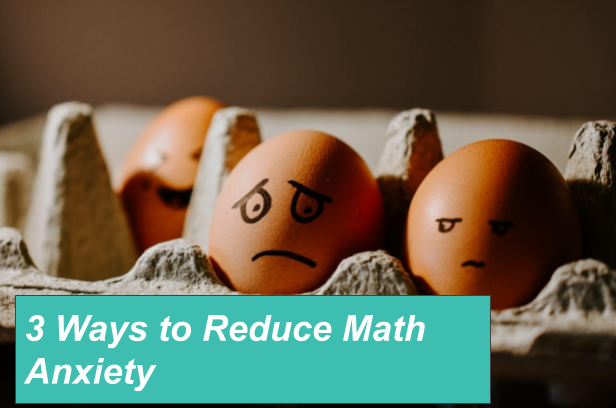3 Ways to Reduce Math Anxiety

If your experience is anything like mine, you hear it all the time. “I’ve never been good at math,” “Math makes me nervous,” “I’ve never been a ‘numbers’ person.” These kinds of feelings about mathematics seem to permeate throughout society, and you don’t need to search for very long to find data that tells the same story. In one survey of U.S. adults, 93% reported they felt some level of anxiety about math.1 What’s worse is anxiety seems to increase inequities within our math classrooms. Research of middle and high school students found that girls experience higher levels of anxiety toward mathematics than boys.2
Taking steps to reduce our students’ harmful feelings of anxiety is an important aspect of creating more equitable math classrooms. Here are three ways to help our students reduce their math anxiety.
Process over Product
What causes all of this anxiety about math? According to researchers, much of it has to do with how success is defined.3 When students prioritize correct answers and speed, anxiety tends to rise. That’s not great news because accuracy and speed have been and continue to be popular and efficient ways to evaluate student math skills.
However, it also speaks to how we can begin to chip away at the accuracy/speed mentality - by devaluing such narrow definitions of success and instead focusing on processes, applications, and mathematical discussions.
One strategy is to ask students to solve a problem in multiple ways and discuss the pros and cons of each method. In this way, students can begin to focus on the process over the correct answer. Another strategy is to encourage collaborative problem solving. Working with others can be an effective way of showing students that their struggle isn’t unique to them, which can reduce feelings of anxiety.
Open Questions over Closed
Asking students to converse with each other about mathematics is another way to chip away at math anxiety. But high quality student math discussions can be difficult to engineer! The International Institute for Restorative Practices (IIRP) suggests teachers get into the habit of asking open ended questions as a way of spurring quality student discussion.4 IIRP has found that open ended questions can prompt deeper thinking about math concepts while inviting everyone to share their thinking - a key component of building student confidence and relieving anxiety. In practice, that means asking more “how” questions, and less “what” questions. “How could this technique be applied to solve other problems?” may lead to deeper conversations than “What other problems would this technique help us solve?”
Feel over Conceal
Research also points to the importance of helping our students acknowledge that they may be feeling anxiety about mathematics. It is easy to make ourselves believe that drawing attention to it might make it worse, but the opposite seems to be true. In one study, when students discussed or wrote about their anxiety before a test they performed better on the test.5 Clearly this conclusion relates specifically to test anxiety, but one wonders if similar effects may be found if students were to talk about their anxiety in non-testing situations. It may be worth a try.
The most important lesson here is that we, the mathematics teachers, can positively impact our students’ anxiety about mathematics. Whether it’s focusing on processes over correct answers, encouraging mathematical discussions, or helping students talk about their anxieties, we can work to make our classrooms more equitable by reducing students’ math anxiety.
Pete Grostic, Ph.D
Executive Director
Please join Math Medic Foundation in our mission to improve math outcomes for all. You can contact us to get involved or donate here.
Follow us on Twitter!
1 Strategies for Reducing Math Anxiety - Christie Blazer
3 Mathematics Anxiety: What Have We Learned in 60 Years? - Dowker et al.
4 Reducing math anxiety utilizing Restorative Practices approaches - Angela Green
5 Writing about testing worries boosts exam performance in the classroom - Ramirez and Beilock
08/07/2023